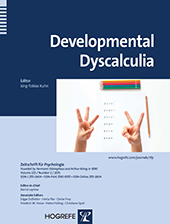References
(2008). The mental wealth of nations. Nature, 455, 1057–1060. doi: 10.1038/4551057a
(2010). Which neurodevelopmental disorders get researched and why? PLoS One, 5, e15112. doi: 10.1371/journal.pone.0015112
(2015). Arithmetic fact retrieval: Are there differences between children with developmental dyscalculia and those with mathematical difficulties? Zeitschrift für Psychologie, 223, 110–119. doi: 10.1027/2151-2604/a000209
(2015). Interventions for children with mathematical difficulties: A meta-analysis. Zeitschrift für Psychologie, 223, 129–144. doi: 10.1027/2151-2604/a000211
(2015). Pathways of number line development in children: Predictors and risk for adverse mathematical outcome. Zeitschrift für Psychologie, 223, 120–128. doi: 10.1027/2151-2604/a000210
(2013). Numerical ability predicts mortgage default. PNAS: Proceedings of the National Academy of Sciences of the United States of America, 110, 11267–11271. doi: 0.1073/pnas.1220568110
(2015). Internalizing problems in children and adolescents with math disability. Zeitschrift für Psychologie, 223, 93–101. doi: 10.1027/2151-2604/a000207
(2015). Working memory functioning in children with poor mathematical skills: Relationships to IQ-achievement discrepancy and additional reading and spelling difficulties. Zeitschrift für Psychologie, 223, 83–92. doi: 10.1027/2151-2604/a000206
(2015). Working memory and number sense as predictors of mathematical (dis-)ability. Zeitschrift für Psychologie, 223, 102–109. doi: 10.1027/2151-2604/a000208
(2015). Developmental dyscalculia: Neurobiological, cognitive, and developmental perspectives. Zeitschrift für Psychologie, 223, 69–82. doi: 10.1027/2151-2604/a000205
(2005). Does numeracy matter more? London, UK: National Research and Development Centre for Adult Literacy and Numeracy.
. (1993). The ICD-10 classification of mental and behavioural disorders: Diagnostic criteria for research (10th ed.). Geneva, Switzerland: Author.



